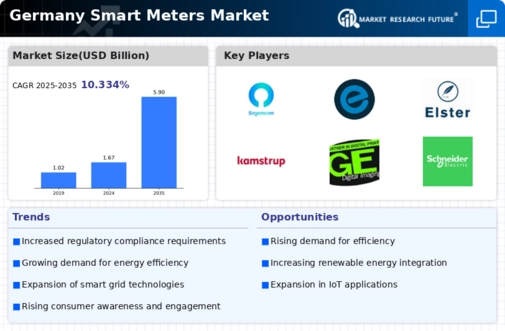Consumer Awareness and Engagement
Consumer awareness regarding energy consumption and sustainability is a driving force in the Germany smart meters market. As individuals become more conscious of their energy usage, the demand for smart meters that provide real-time data and insights is increasing. Surveys indicate that over 70% of German consumers express interest in smart metering solutions that enable them to monitor and manage their energy consumption effectively. This heightened awareness is further supported by educational campaigns from energy providers and government initiatives aimed at promoting energy efficiency. As consumers engage more with their energy usage, the Germany smart meters market is likely to see a surge in demand for advanced metering solutions that cater to this growing interest, ultimately leading to a more informed and proactive consumer base.
Integration of Renewable Energy Sources
The integration of renewable energy sources into the energy grid is a crucial driver for the Germany smart meters market. As Germany aims to transition to a more sustainable energy system, the need for smart metering solutions that can effectively manage the variability of renewable energy sources becomes increasingly apparent. Smart meters facilitate the monitoring and management of energy generated from sources such as solar and wind, allowing consumers to optimize their energy usage based on real-time data. This capability is essential for achieving Germany's ambitious renewable energy targets, which aim for 65% of electricity consumption to come from renewable sources by 2030. Consequently, the demand for smart meters that support this integration is expected to rise, further propelling the growth of the Germany smart meters market.
Government Incentives for Energy Efficiency
The German government has implemented various incentives aimed at promoting energy efficiency, which significantly impacts the Germany smart meters market. Programs such as the Market Incentive Program (MAP) provide financial support for the installation of energy-efficient technologies, including smart meters. These incentives not only lower the initial investment barrier for consumers but also encourage the adoption of smart metering solutions that contribute to overall energy savings. Reports suggest that households utilizing smart meters can achieve energy savings of up to 15%, further incentivizing their adoption. As these government initiatives continue to evolve, they are likely to stimulate growth in the Germany smart meters market, fostering a culture of energy efficiency and sustainability.
Regulatory Support for Smart Meter Deployment
The Germany smart meters market benefits from robust regulatory frameworks that promote the deployment of smart metering technologies. The Federal Network Agency (Bundesnetzagentur) has established guidelines that mandate the installation of smart meters for consumers with an annual consumption exceeding 6,000 kWh. This regulatory push is expected to lead to the installation of approximately 30 million smart meters by 2030, significantly enhancing energy management capabilities. Furthermore, the German government has set ambitious climate targets, which necessitate the integration of smart meters to facilitate energy efficiency and renewable energy usage. This regulatory environment not only fosters market growth but also encourages innovation within the Germany smart meters market, as companies strive to meet compliance requirements while enhancing their product offerings.
Technological Advancements in Metering Solutions
The Germany smart meters market is experiencing rapid technological advancements that enhance the functionality and efficiency of metering solutions. Innovations such as advanced data analytics, IoT integration, and enhanced communication protocols are transforming traditional metering systems into sophisticated energy management tools. For instance, the integration of IoT technology allows for seamless communication between smart meters and energy management systems, enabling real-time monitoring and control. Additionally, advancements in data analytics provide utilities with valuable insights into consumption patterns, facilitating better demand response strategies. As these technologies continue to evolve, they are expected to drive further adoption of smart meters across Germany, positioning the country as a leader in smart metering solutions within the Europe region.






















